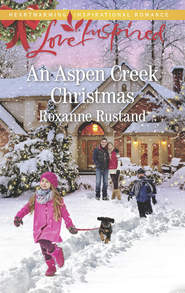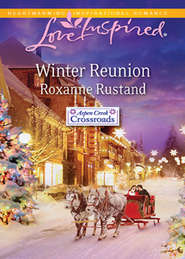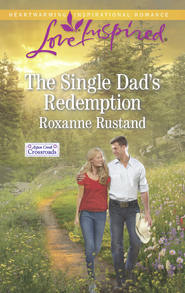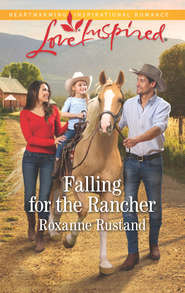По всем вопросам обращайтесь на: info@litportal.ru
(©) 2003-2025.
✖
Second Chance Dad
Автор
Год написания книги
2019
Настройки чтения
Размер шрифта
Высота строк
Поля
Beth nodded. “If that happens, we’ll take road trips. We’ll come visit once a month, if you can stand us.”
“Or at least we can stay in touch via iChat or Skype, so we can see each other,” Olivia added. “You’ll feel like you never even left home.”
The lilting notes of Bach’s “Solfegietto” rang merrily from the depths of Sophie’s purse, which meant she now owed a dollar to the coffee fund jar.
“Sorry—I thought I’d turned it off.”
“Answer it,” Keeley said, looking up from a book in her lap with a grin. “No penalty. We haven’t even started yet.” At the unfamiliar phone number on the screen Sophie hesitated, then answered anyway…and at the woman’s greeting she felt her heart lodge firmly in her throat.
“Sophie Alexander? This is Grace Dearborn. I need to speak to you right away.”
Sophie wearily leaned back in her desk chair and rubbed the back of her neck.
On Monday and Tuesday she’d traveled the county to meet nine of her homebound patients and begin taking over their physical therapy sessions. Some of the older ones had taken a good look at her, then asked when the real therapist—that older gentleman—would be coming back. Some appeared too frail to be capable of significant progress, while others had been testy and uncooperative.
Kindly Dr. McLaren had practically booted her out of the door.
But during last Saturday’s phone call, Grace Dearborn had been crystal clear again about her expectations, and had expressed specific concerns about the fact that Sophie hadn’t yet convinced McLaren to resume therapy.
Pointing out that the man had a perfect right to refuse any and all forms of medical care hadn’t impressed Grace in the least, and she hadn’t wavered a bit in her personal interest in his case, either.
Sophie glanced at her watch, then powered her laptop down and sighed. Worries about the future had fluttered through her thoughts like a legion of bats all night long.
Unable to sleep, she’d been on the internet since four o’clock in the morning searching for areas in the Twin Cities offering affordable housing, hospitals and rehabilitation centers close by, and school districts with good support systems for kids with disabilities.
She had no plans to fail at the challenges here in Aspen Creek, but it only made sense to look ahead. Motherhood and some of the mistakes she’d made in the past had driven that point home more than once.
Her stomach twisted. How would Eli fare if he had to move away from this familiar little town and the only home he’d known? Change was so difficult for him…
“Mom?”
At the sound of his drowsy voice, she turned toward the door of her bedroom, her heart catching on a burst of love. He was nearly eight now, his dark eyes and near-black hair a gift from his biological dad’s Greek heritage, though he had her light complexion. He was so very young to have experienced so many tough times.
Some days, it seemed as though they went from one meltdown to the next, sometimes leading to scenes in public that drew unwanted attention. Eli didn’t have the self-awareness to see it now, but if he ever did understand how different he was from other children, what then? Where was the fairness in life?
“Bad dreams?” She welcomed him into her arms as he flew across the room and wrapped his arms around her, nearly knocking her over.
She could feel his tear-streaked cheek against her neck and knew he’d been crying, probably over his father again, because the night of Rob’s death had been a true nightmare and one neither of them could forget. He hiccuped softly, his small body clinging to hers as if just an embrace wasn’t enough.
Her eyes burned. There were so many bad people in the world. People who murdered and cheated and stole; people with no apparent shred of honor or decency.
And yet, God had taken one of the good guys—a quiet, unassuming friend who had quietly stepped into her life when Eli’s real father dumped her and disappeared before Eli was even born. Rob had been a gentle, loving father, and a faithful husband.
Maybe their relationship hadn’t been the stuff of fairy tales and head-over-heels love, but that was only found in novels anyway. Even without the hot flame of romance, they’d still shared a good life together, and had been kind and caring to each other. Good friends. Companionship. What more did anyone need?
With hard work and big dreams they’d bought their cottage in Aspen Creek and had been looking ahead to a secure future. The family structure had been stable. Dependable. Predictable—which had been so important for Eli’s day-to-day routine.
And then Rob was gone.
“Dad died and we couldn’t stop it,” Eli whispered brokenly. “Even the EMTs couldn’t make him better. They’re ’sposed to fix people, not let them die.”
She’d healed over the past two years, but now the old fracture of her heart deepened a little more. “That’s not true, sweetheart. They didn’t let your dad die. It was out of their control. Even if he’d been in the biggest, fanciest hospital, the doctors probably couldn’t have saved him.” The words tasted like sawdust, but she marshaled a comforting smile and soldiered on. “Someday, I might meet the right man, and then you’ll have a daddy to do things with you again. Would you like that?”
He gave her a blank look. “I just want my real dad back.”
“I know. We’ve talked about this before, sweetheart. But that just isn’t possible.”
“A new one could die, too.”
Yesterday had been the last day of school, and traditionally it was also Bring Dad to Lunch Day—probably so the dads could help lug everything home from crammed desks and work folders.
She hadn’t been the only mom there, by far. But Eli had watched with a lonely expression as the other boys and their fathers teased and roughhoused, and he’d barely noticed that she was there.
“You had Todd, and he went away.” His voice wobbled.
She closed her eyes briefly, wishing she could undo the selfish choice she’d made a few months ago. She’d thought she was ready for a little casual dating, but it hadn’t taken more than a few weeks of seeing Todd on Saturday evenings before she realized how wrong she was about herself, and how thoughtless she’d been.
The greatest impact had been on Eli, who still missed his father even more than she’d realized.
Todd had mostly ignored him, though that might have been for the best. He’d been impatient with Eli’s lack of coordination, and when the three of them went on a picnic, the man had been irritated by Eli’s constant chatter about the Harley he’d seen in the parking lot.
Change had always been difficult for Eli—the brief presence of a new man in Sophie’s life had unsettled him; the abrupt departure had affected him just as much.
Agitated, he’d pelted her with questions when she told him that Todd wouldn’t be coming back, and then he’d retreated to his room for hours and immersed himself in his growing stack of books on Harley-Davidson motorcycles. He’d even refused to come out for supper that night.
“Why?”
Eli’s question jerked her out of her thoughts and back into the present. “Todd and I just weren’t a good match.”
Not even close, given his growing curiosity about her financial situation. Surely you got a whopping settlement after your husband died, he’d marveled with a gleam in his eyes. She’d already been worried about his callous behavior toward Eli, and she’d ended their relationship instantly after that.
“But why?”
“We just weren’t…compatible,” she said. “We…didn’t like the same things. You are the biggest blessing in my life, Eli. No one could ever hope for a better son.” And a man who can’t see that will never have a place in my life. Period.
“But…” His voice trailed off, his flash of hope clearly fading away. “He told me he was gonna get a motorcycle.”
“I don’t think he did, honey. But don’t worry, sweetheart. Things always work out for the best. And you’ll always have your grandma and two grandpas and me.”
He pulled away and looked up at her, his expression stark. “But you could die and they could, too,” he insisted. “You’re all old.”
She coughed to cover a startled laugh. Old? So that’s what this was about—his ongoing worry about everyone else in his family dying, too.
“Your dad had a very rare problem. Remember? An aneurysm the doctors couldn’t fix. It doesn’t mean the rest of us will die like that.” Hollow words, when the child had seen the frantic efforts of the EMTs in their living room, and then had paced the waiting room of the hospital with her while Rob was in surgery. “I’m only twenty-nine and your grandparents are in their sixties. We could all live to a hundred.”
His gaze skated to the family portrait on the wall, then he dropped his head. “But an aneurysm could kill anyone and you wouldn’t know it until you were dead. If it happened to Dad, it could get you and me and Grandpa, too.”
“I hope not. But let’s talk about something else. Okay? You look so tired. Can I tuck you in for an extra hour before we need to leave for Grandpa’s house?”











